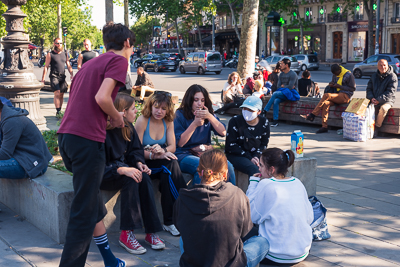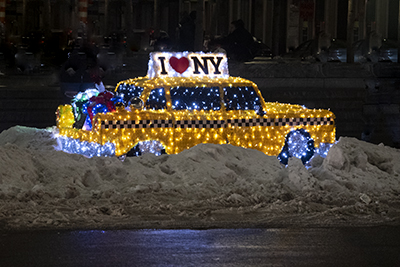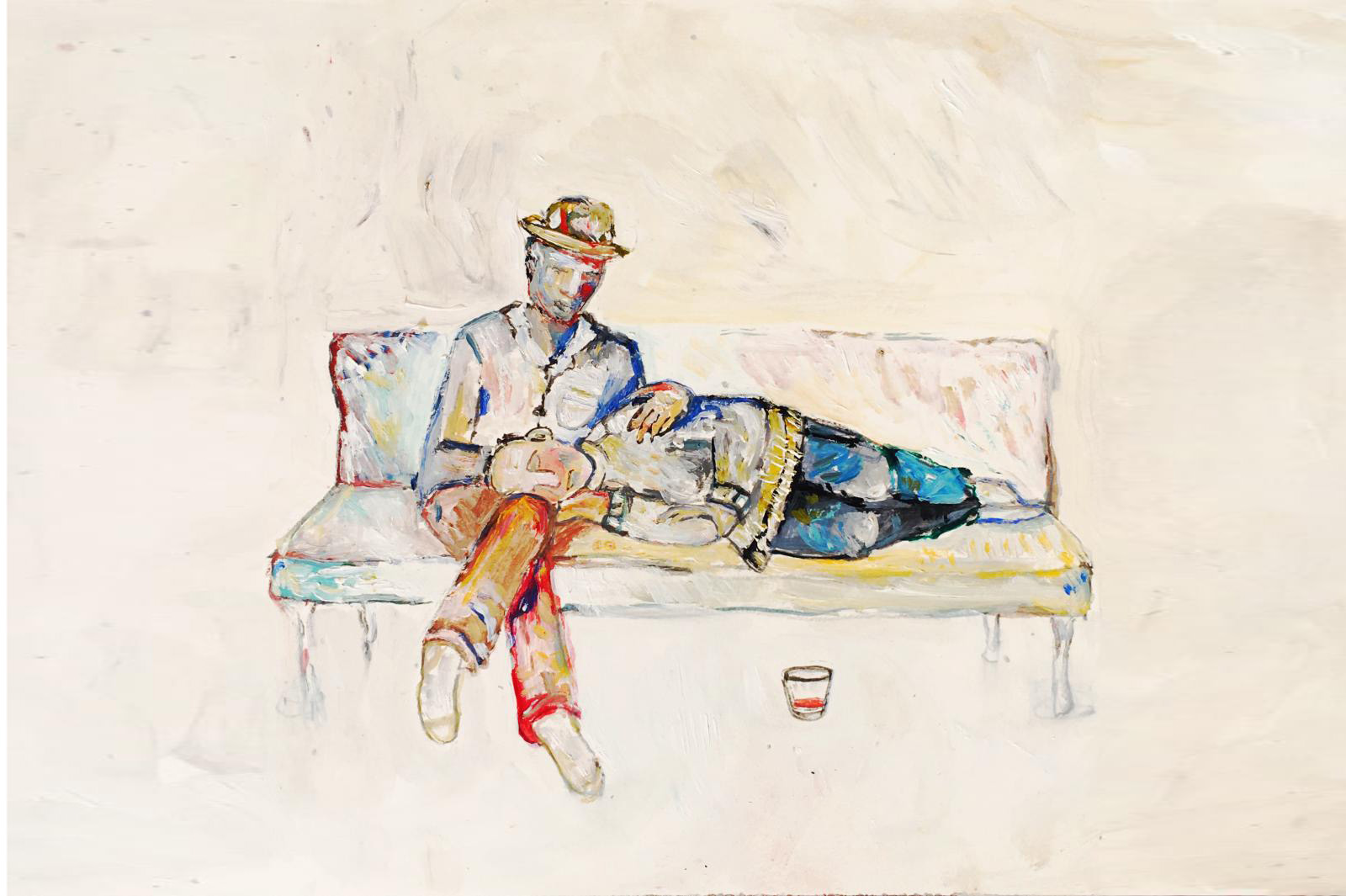Tope Folarin’s debut novel, A Particular Kind of Black Man, is set partly in Utah and partly in Texas, and it is largely based on the author’s actual experience as the son of Nigerian immigrants. It is a coming of age story and also an immigrant narrative focusing more on the experience of the first generation American children of Nigerian parents. It is both uplifting and heartbreaking—heartbreaking in the way all immigrant narratives are heartbreaking. The father struggles to keep the family together in a small, mostly white small town in Utah after the mother begins to show signs of dementia. Her dementia, undiagnosed, could very well be related to the trauma of leaving home and having to make a life in a strange country. Eventually the mother returns to Nigeria and the father remarries. The narrator is the older son, and he grows up ignorant of both his parents Nigerian culture and popular African American culture. Most of the narrative is about his discovery of his blackness, culturally and politically, and about his search for his mother. It is uplifting in its resolution: despite all the challenges thrown his way the narrator eventually manages to find his own way, and of course because of its beautiful language—the opening section won the Caine Prize in 2013.
—Helon Habila, author of Travelers: A Novel (W.W. Norton) and professor of creative writing at George Mason University, Washington, D.C.
Note: The following short story originally appeared in the 2016 Caine Prize Anthology.
Our father lifts his axe into the air and brings it down heavily onto the goat’s neck. A lush curtain of blood gushes down from the wound, muscles and tendons peeking out before tumbling into the grass.
As the blood rushes out, our father snaps one of its legs. And then the other.
The goat convulses on its side in the middle of our backyard. It is bleating in muffled terror through a gag that our father placed around its mouth just a few minutes ago. The gag is so tight that it has stretched the goat’s mouth into an evil caricature of a smile. A smile now refuted by a bleeding frown a few inches below.
Our uncle is laughing and jumping but we are horrified. We can’t help it — we begin to cry, softly. Our father tells us to shut up. He wipes his face quickly, but not quickly enough. We have already seen his tears. “What did I tell you before?’ he screams. ‘This is supposed to be a moment of joy!”
Yes, he told us this before, as we were planning how we would capture it. He told us that its life had been created for this purpose. He told us that God doesn’t have to provide us with any justifications for His commandments, that our only responsibility is to follow His will. We screamed and cried and refused to help him, we told him we would never do what he had asked us to do, but in the end we obeyed him, because he is our father and he is a man of God.
Yet now we know that we have made a terrible mistake. We have done something evil. It seems as if our father realizes this as well — his eyes are red and brimming. He rubs them and turns away from us.
The goat won’t stop dying. It is trying to wheeze the last notes of its life through its gag, but it’s choking on the long tongues of blood that are violently ejaculated from its second mouth with each ragged breath. The tongues lap at our feet. We cannot move.
After a few minutes death finally comes. A shuddering last breath and it’s over.
We stand silent for a bit, trying to remind ourselves what our father said when he woke us up this morning. That by doing this we are proving our faith and our commitment to God. That everything would be easier if we thought of him as just another kid. Dad drops his axe and glares at us. Trance broken, we pull on our gloves and aprons and collect the blades and buckets from the stoop.
Our hands will not stop shaking. We start with blades on its skin, cutting away the hair, so slowly, so carefully. Our father makes a long vertical cut from the second mouth to the anus. Something stinks, something is putrid and rotting, and then the steaming innards slide out. We bend and dump the gunk into our buckets. We go to work on the stuff in the buckets, cleaning everything; our father told us this morning that nothing can be thrown away, or none of this will work. Our father and our uncle continue working on the animal, methodically breaking it down. Our mother watches us from the window — she is saying something, no, she is screaming something but we cannot hear a single word because the window is closed.
***
My brothers say I eat too much.
Mom shakes her head as she places another pancake on my plate. “That is the last one. OK? You’ve already had five.’ She tugs at my ear. ‘All this food you are eating, I don’t know where it is going.”
“Five is definitely not enough for him,” says Dele.
“Yeah, he’s like a monster or something,” says Seun.
They are younger than me, and they’re always saying the same thing, always agreeing with each other, always double-teaming me and everyone else. In other words, they are annoying as hell.
Mom chuckles. “And so? Both of you should mind your business. No one is talking to you. Let him eat. That is what makes him happy.”
She’s right — I love to eat. I am the family garbage disposal, a walking trashcan, and I’m still the skinniest kid in school, probably the skinniest kid in the city.
Just a few months ago, on the stern advice of my doctor, I went on a 3,000-calorie diet before trying out for the basketball team. Dr Kolson checked my reflexes, my blood pressure, placed his cool hands on my back, asked me to cough, and did a double-take when I told him my plans.
“Well, son,” he said, pulling his glasses down his nose. “You’re going to have to gain some weight.”
Mom supported the idea, and Dad quietly acquiesced, so they bought me several boxes of power bars, and I gorged myself on six meals a day all summer long. I’d never been happier. At the end of the summer, I stepped on a scale and, of course, a net loss of three pounds.
I polish off my pancake in about three seconds and join Mom at the stove. “Please,” I say. I give her my best smile. The one she can’t resist. ‘Just one more. I promise.’ This is our Saturday morning ritual. After my fifth pancake I come and see her at the stove, and she’ll make another one, and I’ll devour it, and then another, and then another. Usually I eat ten pancakes. Sometimes more.
Mom’s wearing one of her flowing fluorescent wrappers, and she looks over at Dad as she tucks in an unravelling edge. Dad turns a page in his Bible. The sun is streaming in from the kitchen window onto the table and his tired face. He hasn’t said a word to me, to anyone this morning. A stack of pancakes sits uneaten next to his arm.
“That is all for now,” she says. “Lunch is coming soon. Try to be patient.” She turns away from me.
For a moment all I feel is anger washing through me, for a moment I am actually full, this anger is so satisfying, but then my stomach begins to growl, loudly, insistently. I place my plate in the sink, go up to my bedroom and close the door.
***
“Can I come in?” the voice says. It’s Mom.
“Yes, Ma.”
Mom opens the door and surveys my room. My Star Trek: The Next Generation poster on the wall, my slim bookshelf filled with my favorite fantasy novels, my unmade mattress on the floor. I am sitting next to the bookshelf, bouncing a tennis ball off the wall.
“Can I come sit next to you?”
“Yes, Ma.”
Mom strides over and sits. She leans against me, and I can smell her hair. It smells earthy and brown, and I realize that I haven’t smelled her hair in years. Now a rush of memories — my small arms around her hot neck; she’s leaning close and rubbing her nose against mine; she’s tickling my neck after whispering in my ear.
“I am sorry about earlier,” she says. “I know you are still hungry. I am already preparing lunch.”
“It’s OK.”
“That is actually the reason I came to see you.” She takes the ball from my hand. She tosses it into the air, catches it, tosses it again. Then she places it on the floor. She clears her throat.
“I know this will be difficult, but you need to find a way to eat less.”
“Ma?”
“You need to eat less food.”
“Why?”
Mom pauses.
“I cannot tell you why. But trust me that it is for your own good.”
She stands and walks over to my bed. She sits. I can’t remember the last time she actually visited my room. Dad is usually the one who barges in, who is waking me up or lecturing me or searching around for something or another. It doesn’t feel like my room now that she’s here. It feels like we’re somewhere else, or like I’m dreaming, one of those dreams that seem so familiar and real that you almost forget to wake up.
She looks down for a moment, and when she looks up her eyes are red, tears beading at the corners. “Please, my son,” she says. “Try to find the strength to eat less. Especially around your father. If you get too hungry, you can tell me and I will try to find something for you. But it is important that from today you find a way to be satisfied with what I feed you.” She leans toward me and grabs my hand. “This is very, very important. Can you promise me that you will at least try? Can you try for your mother?”
She seems frantic now. I am bewildered. But I can’t stand to see my mother upset.
“Yes, Ma. I will try.”
“Yes, my son. Just do it for me. Just for a little bit. I love you so much.”
She hugs me and her shoulders are shaking and I rub her back like she once rubbed mine, in those days before I could walk or talk.
In those days before I consciously made promises I know I can never keep.
***
My father is a prophet.
God speaks to him all the time. God told him that Mr Parker, our mailman, had cancer. One day my father told Mr Parker to go see his doctor about his colon, and a few days later Mr Parker returned with his wife, and she would not stop hugging my father, she would not stop crying, she would not stop thanking my father for saving his life.
God told him that the Challenger would fall from the sky. I will never forget that morning, my entire family gathered around the television, the Challenger rising so beautifully into the air, my heart soaring with it, and then my father saying it is going to explode, it is going to explode, and I look back at my father, terrified that he might be right, then back at the screen, praying that he’s wrong, and then that beautiful white blip detonates and dissolves, a trail of fire in the sky, and I can’t stand to look any longer, instead I look at my father, with hatred now, because something tells me he willed this into existence.
God told him that my uncle would be born retarded. My father has told us many times how he told his own mother that God was going to punish her because she refused to find another husband after her first husband — my grandfather — died. Because she abandoned my father and woke up in a new man’s bed every morning. When she discovered she was pregnant she remained home, and her mother came by each day and fussed over her, did anything she asked, and her sisters hugged her close and read stories to her growing stomach. For the most part my father ignored her — the few times he spoke to her he told her she would be having a boy, and that the boy’s brain would never function properly. She cursed at my father, told him to leave her alone, and then her water broke and her family rushed her to the hospital and she returned home with a beautiful boy whose eyes were too far apart, whose mouth was locked in a permanent smile.
My father is not a prophet.
God did not tell him that each of his businesses — including his computer business, his shoe business, his grocery store, his electronics store, his furniture store, his Nigerian clothes import-export business, his Nigerian news magazine — would fail.
God did not tell him that Mandela would leave prison one day. Whenever we heard about South Africa on the news, heard about how the world was applying pressure to the government of South Africa to release Mandela, my father would say it will never happen, it will never happen, Mandela will die in prison. He said this on the day we saw Mandela walk out of prison, looking older than we ever could have imagined; even as Mandela raised his fist in the air my father said it will never happen. To this day my father believes that Mandela died in the Seventies, that the man who left prison that day was an imposter.
God did not tell him that his mother would die. I’m not sure if my father ever believed she would die. One day he heard she was sick and he purchased a gold cross and prayed over it for three days. He sent the cross to her by express mail, and the following week his sister called and told him she had passed away. My father shook his head and hung up the phone and continued watching TV as if nothing had happened.
God did not tell my father that he would struggle so much in America. My father still can’t believe that he’s so broke. He still believes that our lives aren’t real, that any day now he will wake up in a mansion with a squadron of luxury cars outside, hundreds of gold bars piled neatly under his bed.
If you ask my father about these things he will tell you that God has never lied. Someone will step forward and say that Mandela died in prison. His mother will poke out of her grave and visit us in America. My father will be wealthier than anyone who has ever lived.
***
Dad’s sitting at the table when I get to the kitchen, almost like he’s been waiting for me.
“I guess it’s time for your nightly cookie,” he says.
Before I can deny it, or offer an excuse, Dad shakes his head. “Don’t worry, it’s fine,” he says. “Go get a couple, and get one for me as well.”
I wonder how long he’s known. For the past year I’ve been sneaking cookies out of the kitchen every night, around midnight or so. I started doing this after I turned 16. Around then I noticed that my constant, gnawing hunger had only grown worse. It no longer mattered how much I ate during dinner; at midnight I’d wake up to my growling stomach, and I’d spend the rest of the night staring at the ceiling, waiting for the sun to rise so I could eat again. After a few nights of this I decided that I’d steal a cookie or two out of the pantry at night, after everyone was asleep. I decided to do this even though my father once told me that my hunger is a burden I will have to bear for the rest of my life. That I would prove my worthiness to God if I learned how to control it. ‘God gives each of us a weakness so that we have a chance to draw closer to Him,’ he told me. I must have been nine or ten. “Your weakness is your hunger. If you can learn to overcome it, you will be proving to God that your devotion to him is more important than your greatest temptation. And He will reward you greatly.”
For many years afterward I repeated these words to myself at night, like it was my mantra, like it was a prayer, as my stomach knotted up and consumed itself. For a while these words were enough. But then I turned 16 and my hunger was threatening to become the most important part of me. I decided to do something about it. Just one or two cookies each night. Consumed quietly in the comfort of my bed.
Even after what Mom told me a few days ago I can’t stop. I can’t.
Now I go to the cupboard and pull three chocolate-chip cookies from the package on the top shelf. I pass one to Dad and sit across from him. He shoves it into his mouth. “Come on, eat up,” he says.
I wonder if this is a test. Maybe he wants to see if I’ll actually eat the cookies in front of him. If I will sin in his presence. I sit silently while he munches. When he finishes he asks me to pass him another one. “And finish that one in your hand,” he says. “I promise I won’t bite you.”
I slip the cookie into my mouth and eat it. It doesn’t taste as good as it does when I’m by myself. After I’ve finished it I wait for that surge of relief to pulse through me but it never comes.
My father rises and walks to the window.
“God has never led me astray,” he says. “Never. Not once. Even when I think he’s wrong. Even when I doubt His power and wisdom, He proves me wrong. But this thing that God has asked me to do now — it is too much.”
He’s facing the window, so I can’t tell if he’s serious or not.
“Dad, I don’t think I heard you.”
“Yes you did.”
God asking too much? I don’t know what to say. This can’t be my father. My father who prays at least ten times a day. My father who insists that we attend church four times a week. My father who once banned us from watching anything but Christian television for a year. My father who instantly decided to marry my mother after she recited the first chapter of Psalms from memory during their first date. My father who fasts for days at a time, sometimes weeks, because, he says, God told him to.
I’ve never seen my father this unsure of himself before.
What has God asked him to do?
My father remains where he is. I don’t say a word.
I shrug. “Well, you’ve always told me to trust God, no matter what.”
Dad turns from the window and smiles at me. Then he returns to the table.
“Did I ever tell you that you were a miracle baby?” he says.
“No.”
“Ah. I guess I was waiting until you were a man. I might as well tell you now.” He nods and closes his eyes. “When your mother was about five months pregnant we went to the hospital for a routine check-up. The moment the doctor placed the stethoscope on her stomach I could tell that something was wrong. The doctor turned on some machines and attached some wires to your mother and called some other doctors in. She didn’t answer any of our questions. About half an hour later she told us that your heart had stopped beating.”
My father pauses. He licks a finger and presses it to the table. When he lifts it I can see that a few crumbs are attached. He slips the finger into his mouth and continues.
“Before your mother became pregnant with you she’d had five miscarriages. She had never carried a child for more than three months. When you got to four months I knew that you were meant to live. That you were our blessing. So when the doctor told me that your heart had stopped beating I smiled at her and told her that I respected her opinion, but that I answered to a higher power. Then I grabbed your mother’s hand and we went to the car and I began to drive. We drove for about an hour, and then the car broke down. Your mother asked me where we were going. I ignored her. I got out of the car and fixed it and started driving again. Your mother started screaming at me, telling me that she wanted to go back home, that she needed some time to mourn. I told her that no one would be mourning anything. I continued to drive. By the time the car broke down again she had fallen asleep. I fixed the car once more and continued driving. Four hours later we arrived at the church where I was saved. I woke up your mother and we walked out of the car, and I knocked on the door until the pastor opened it. When he saw my face he knew what was happening.”
My father is smiling now, and I feel like something is expanding inside me.
“I thought the prayer would take hours and hours, but my pastor just laid his hands on her stomach and prayed for only a few minutes. And then he looked at me and said it was done. And though I have often doubted God’s ability to do the impossible at the moment I knew that you had been healed.” My father shakes his head. “The pastor told me that you were the key to the success of this family. That you would serve a special purpose in our lives. And I believed him. I knew you would.”
My father rises, wipes his face with the back of his hand.
“So whatever happens, always remember that you are here for a reason. Your purpose was preordained.” My father leans forward and kisses my forehead. He has never done this before. Then he turns and walks up the stairs.
After a few moments I shut off the light and go to my room and slip under the covers.
My stomach is silent. I feel full, so so full.
***
Before last week I’d never heard Mom and Dad scream at each other. Before last week, whenever they were upset with each other, they’d exchange a look and disappear into their room for an hour or so, and when they emerged they’d smile at each other and the rest of us with their entire bodies. Last week, though, Mom said something to Dad, or maybe Dad said something to Mom, and they stomped off to their room and slammed the door and screamed at each other in Yoruba for almost two hours. After they finished they left their room separately, first Dad, then Mom. They ignored each other for the rest of the day.
This happened again the next day. And the next.
Now all they do is fight. Anywhere. Everywhere. They slam plates and slam doors and slam each other with their words. Dele says they are arguing about God. Seun says they are arguing about life and death. I’m not sure what they’re arguing about — my Yoruba is OK, I guess, but for some reason Dele and Seun have always understood Yoruba better than me, even though they are younger, even though we were all born in the States. All I know for sure is that Mom is feeding me less and less. Last Saturday she prepared only four pancakes for me. There are no more cookies in the cupboard. Mom says I can’t snack between meals any more.
I’ve never been this hungry in my life.
Two nights ago Mom came into my room and sat on my bed. I know it was her because I opened my eyes just a little when she walked in. She stroked my hair and kept stroking it. She said a prayer over me — I could not hear her words. Then she whispered something in my ear, like she used to when I was little. She said I will always be with you.
***
Dad says: “Go. Chase them.”
My brothers and I stand, dumb, glancing at one another, and Dad says “Go on.”
Uncle is laughing and clapping his hands. Dad’s expression does not change. I don’t think I’ve ever seen him so serious before.
“This is what my brothers and I did when we were your age. Your grandfather made us earn our food. All of you have been too spoiled by America. You can just go to the store and buy bread. You can just go to a machine and buy candy. That is why you don’t value your food. It is not your fault. There is just too much here.”
And when he says ‘here’ he lifts his hands, indicating — I guess — the sky, the grass, the farm, the sun, the goats. Uncle nods solemnly, as if he’s just heard someone deliver an acceptance speech for the Nobel, even though we’ve all heard this speech about a million times. Every three or four months Dad drives us to some random farm somewhere, and he gives the same speech before asking us to milk some cows or feed some hens or pluck a few fat red apples from a tree. We’ve never had to chase any animals, though. Dele and Seun immediately assume a runner’s stance but I don’t move. I have my maturity to defend after all; I’m too old to be chasing a bunch of little dirty-ass goats. I stare at the ground, but I know that Dad is losing patience, charm exhausted, giving me his better-do-it-or-I-will-embarrass-you-in-public look. Which, considering where we are, is kind of ironic. My father isn’t into irony. I lean forward and place my hands on the ground, like Carl Lewis.
I want to be mad at Dad but now I’m thinking about goat meat, how soft it is, how delicious. Saliva floods my mouth. Maybe if I catch a goat Dad will allow me to eat more than my usual share tonight.
“More like it,” Dad says. “So here are the rules: This isn’t just about the chasing. The first to catch a goat and tackle it to the ground wins.”
“Wins what?” I ask. I’m thinking about goat stew. I wipe my mouth.
Dad says, mysteriously: “You’ll see.”
He lifts his head slightly: “ON YOUR MARKS!”
I sense my brothers at the edges of my peripheral vision, just far enough out so that I can’t really see them, but I can feel them lurking, waiting for an opportunity to burst onto my field of sight.
“GET SET!”
The goats start rustling; maybe they notice the tension in our legs.
“GO!!!”
The goats immediately scatter; we chase them all over the field, probably looking quite goatish ourselves, while Dad and Uncle yell directions at us. The goats are quick, cutting from one direction to another in an instant, kicking the air with their hind legs when they sense that we are close.
Dad says USE YOUR BRAINS, NOT YOUR LEGS! and I examine my surroundings for the first time. There’s a large chain-link fence bordering the field, and the goats — only three of them — are basically running from one end to the other, and sometimes through us as if we’re in the way. I focus on the goat directly in front of me. It has mottled black-and-grey fur, and is shooting shit pellets at me with every step. I stop to catch my breath and Dad says NO STOPPING so I jog while trying to formulate a plan. I figure if I can somehow chase the goat into the fence, angle it in a certain direction, I can pounce just as it’s about to turn. I experiment with this approach, I run hard at the goat and try to force it towards the fence, but the goat catches on to my plan after a few seconds, and now it will only run parallel to the fence. Dad yells NICE TRY, SON.
Another plan. I slow down, almost to a walk, and try to lull the goat into thinking I’m tired. The damn goat figures out what I’m doing before I can start sprinting again, though, and runs even faster.
GETTING TIRED? Dad asks, and Uncle begins to laugh once more.
I drop all the intellectual pretense and began running full-throttle at the goat in front of me. The goat looks back and for the first time I see fear in its eyes. I keep running, imagining the ground as a massive trampoline, trying to leap forward with each step. I gain on the goat and keep going and keep going. Just as I’m about to jump on the goat and tackle it to the ground I look back and notice that Dad is chasing me. I laugh, enjoying the surprise, executing sharp cuts in the dirt, turning suddenly to the left when Dad tries to cut me off, threatening him constantly with my high back kick. I look back again and see my father breathing hard, wheezing, and I laugh louder, run faster, I’m gaining strength, the goats are my friends now. I feel the wind resisting my face and arms, but the running is glorious. I hear someone grunt and look back again; Uncle’s chasing me too, I laugh harder while evading, dodging, cutting, wondering why is he using his arms like that? So awkward, so ungainly, almost as if he’s never run before, for the two seconds I see him running he has already pushed himself to the edge of exhaustion.
I dodge again. Uncle and Dad try to work together, they try to trap me in a corner, and when they’re about to jump I bolt between them, galloping triumphantly away, sticking my tongue out at them, I run, run, run. Dad and Uncle finally stop, they’re grabbing their knees and panting at the ground, and I stop too, pointing and laughing, jumping up and down with excitement, and someone kicks me hard in the small of my back. The air is evacuating my lungs as I collapse, and someone punches me in the ribs and slams my head into the ground. I feel my arms and legs being tied together and I hear Seun yelling I GOT HIM! I GOT HIM! Dad says GOOD JOB, SON, I’M PROUD OF YOU and lifts me into the air. Someone punches me hard in my kidney. I don’t know what’s happening I thought this was a game I’ve never been so scared in my life. Fists coming at me from every direction, someone spitting on my face, stabbing me with sharp metal. I GOT HIM, I GOT HIM, says Seun and I feel myself being lowered, hands violating every part of my body, and they swing me one, two, three times and throw me into the trunk of the station wagon.
***
Dad ignores me as I lie bleeding on the grass. Everything hurts. I want to apologize for whatever I did wrong, to promise I’ll never sin again, but there is a gag in my mouth. I start to scream but my father ignores me. Seun and Dele are standing far away from me. They look terrified. Almost as terrified as I feel. Where’s Mom? I try to scream her name. My father looks up at the sky. He keeps saying the same thing: ARE YOU SURE? ARE YOU SURE? ARE YOU SURE? ARE YOU SURE? ARE YOU SURE? Then he looks off to the side, wildly, like he is expecting someone to show up. No one does. My father is crying, his shoulders are heaving, he lifts his axe into the air and I close my eyes.
Reprinted with permission of the author.






